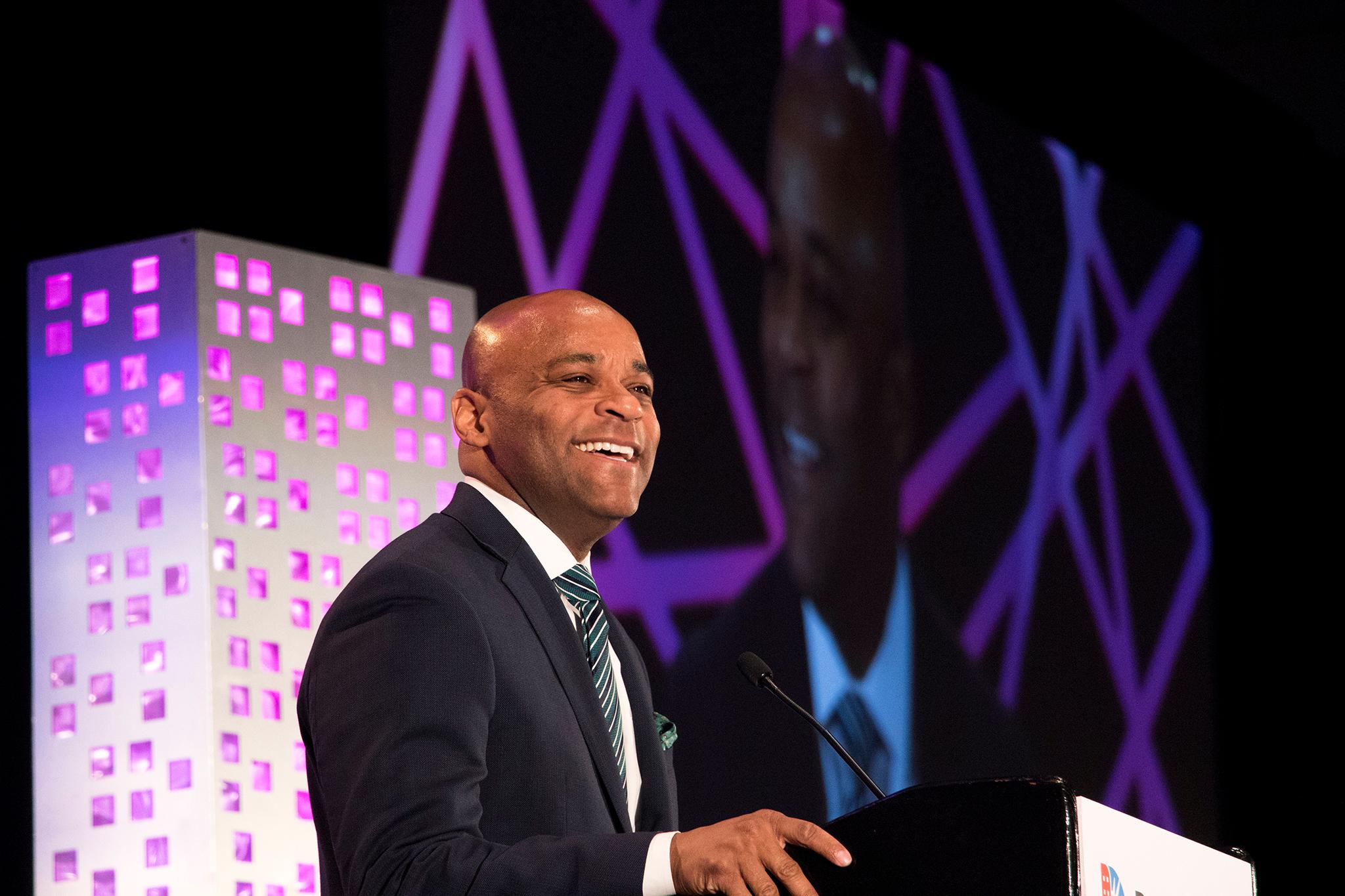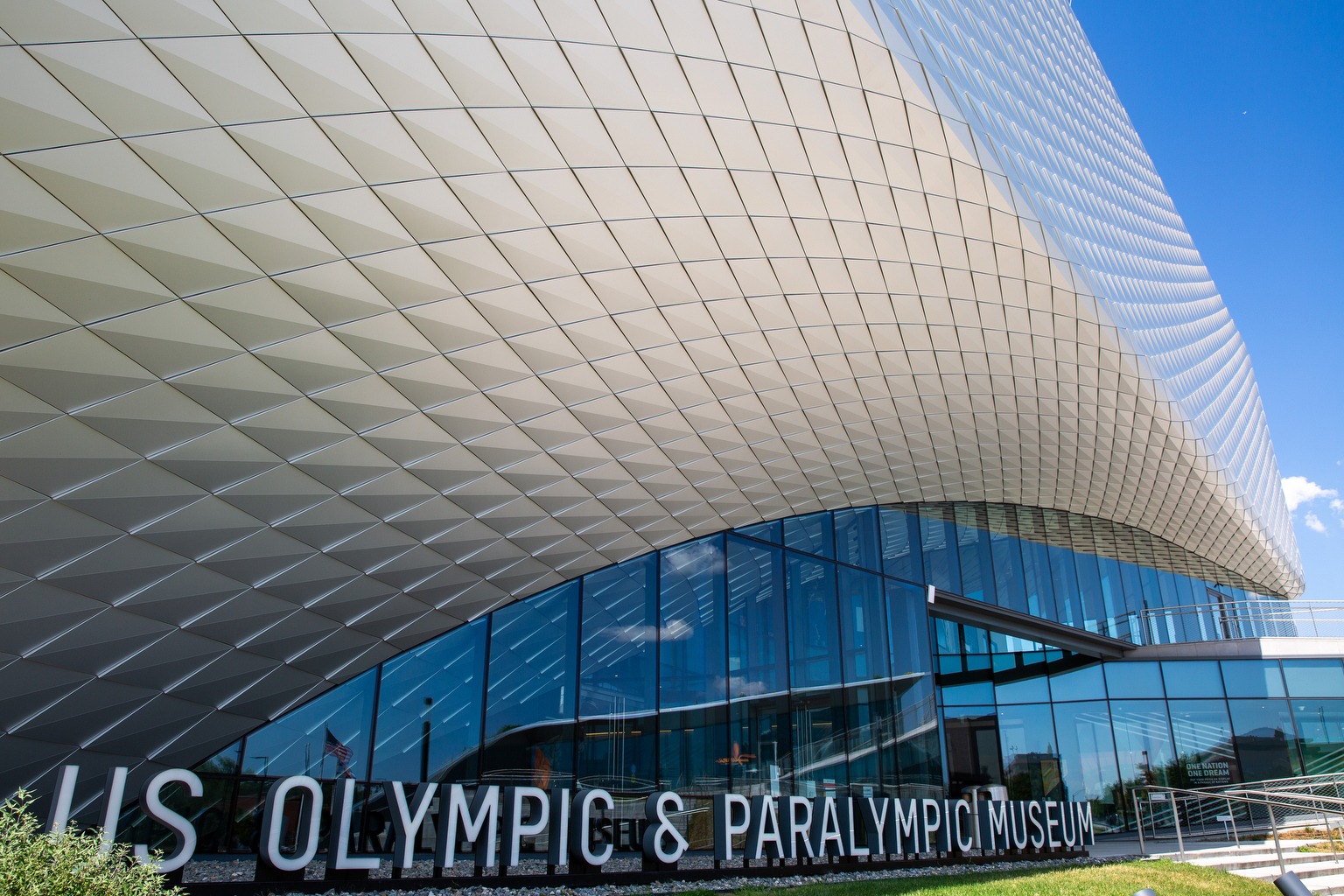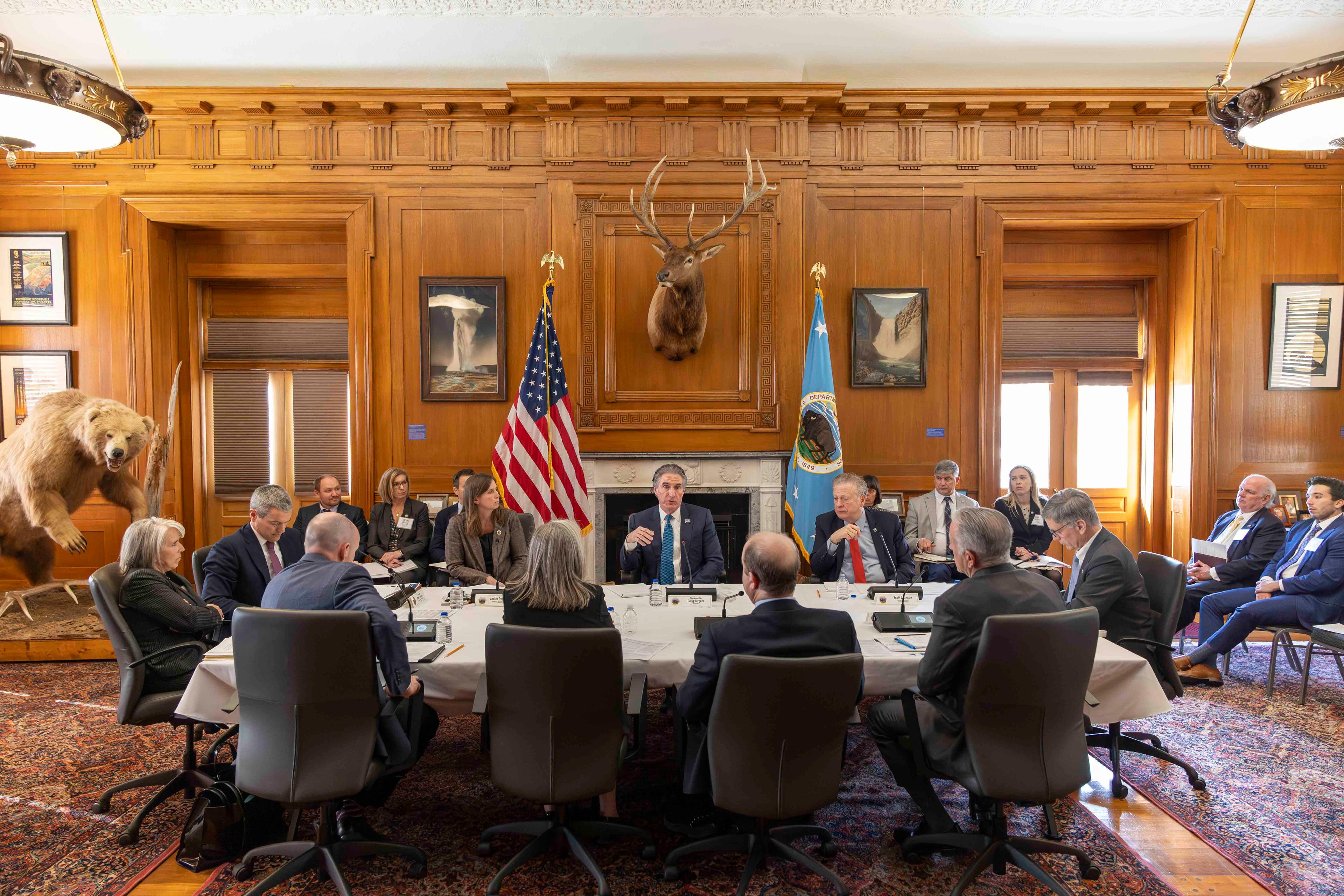

On a bitterly cold January day in 2013, then-Ravens quarterback Joe Flacco heaved a hail mary pass for a touchdown that eventually helped knock the Denver Broncos out of the playoffs. It was a heartbreaking loss.
In the stadium that day was Denver Mayor Michael Hancock, sitting in a suite paid for by United Airlines, the largest carrier at Denver International Airport. The airport is owned and operated by the city. The two tickets he received were worth an estimated $2,000.
Hancock has made a habit of accepting costly sporting event tickets from companies with close ties to the city. In 2016, the mayor sat courtside at a Nuggets game courtesy of Comcast, which has a cable franchise with the city. Hancock got six suite tickets in 2014 to see the Broncos in the AFC Championship game. Four of those tickets came from Centerplate, which has a concession contract at the Colorado Convention Center and Performing Arts Complex. Two of the tickets came from Rod Tafoya, who runs Mission Yogurt, which has an airport concession contract. The total value of those six tickets: an estimated $3,516, according to the mayor’s gift disclosure.
CPR spent six months looking into the different ways companies, particularly lobbyists, are connected to Denver’s city government. As part of that investigation we reviewed Hancock’s campaign finance records and gift disclosures going back to his first days as mayor. It turns out lobbyists aren’t big gift givers, but developers and companies with large city contracts are.
The first gift disclosure form CPR opened was a bit of a shock. Hancock’s 2017 disclosure covering the second half of that year, for example, listed gifts that add up to $44,415. The total was inflated by economic development trips provided to him by the city’s airport (which his administration argued weren’t gifts).
Also on that disclosure form were gift memberships to the Denver Athletic Club, Denver Country Club, and the University Club Denver totaling $17,310. Some city hall veterans say these memberships have been offered to other mayors, but, other than the 2017 gift disclosure, CPR couldn’t find another example of Hancock or Hickenlooper accepting them, according to a review of their disclosures.
The other prominent entry on Hancock’s gift disclosures are tickets, specifically, a collection of Broncos and Nuggets tickets worth an estimated $22,000 since he became mayor. More than $8,000 in tickets came from one person: Pat Hamill, the CEO of Oakwood Homes, the largest home developer in Denver.
The mayor’s office said Hancock followed all rules in accepting the gifts, which were properly disclosed, and CPR’s review of the documents and the ordinance back that up. In fact, the mayor and his staff both noted that he over-reports on his gift disclosures, in the interest of transparency.
By Denver Rules, Large Gifts Can Be Accepted Under a Complex And Shifting Set Of Circumstances
Today, Hancock, his top staff and members of city council aren’t allowed to take expensive tickets from companies they have “direct official action” over, basically some clear authority over the company at the time the gift is offered.
At first glance, the mayor of Denver would seem to have direct official action over companies like Xcel, Comcast, Centerplate, the law firm Hogan Lovells, and United Airlines. These are all companies with significant city contracts or franchise agreements, and all have given Hancock expensive tickets to sporting events. But the mayor said he doesn’t get involved in negotiating or administering contracts, so he often does not have direct official action over these companies.
Hancock said even though accepting tickets from them is allowed, he is always careful.
“I think it’s important when something is offered to the mayor, the first person or group that I turn to is the city attorney’s office,” said Hancock. Hancock said the city attorney's office makes sure that anyone offering gifts doesn't have business pending with his administration before the gifts are accepted.
"In other words, they're not up for a new lease or a new contract, no one's competing," Hancock said.
The ordinance says just because the mayor signs the contracts, that’s not enough to rise to the level of direct official action.
“Direct official action does not include acts that are purely ministerial (that is, acts which do not affect the disposition or decision with respect to the matter),” according to the ordinance. “With regard to the approval of contracts, direct official action does not include the signing by the mayor…”
A look at the situation surrounding United Airlines shows there are a number of exceptions that allowed the gift of playoff tickets in 2013.
United Airlines has deep ties to DIA, accounting for about half of air traffic. United negotiated a new fee package with the city in 2012. About six months later, Hancock received $3,276 in Broncos tickets from United for two different games. Hancock said, when it comes to his authority over United, his role in any negotiations was delegated.
“I’m not sitting at the table negotiating the details,” said Hancock. “I sent a team of emissaries who did that, but they understood from me clearly what I expected and what we wanted to come out of the deal and we got what we wanted, United got what they wanted.”
Still, even if Hancock had direct official action over United at the time he accepted the tickets, another exception in the code allowed him to accept four tickets of any value. That exemption was tightened in 2017, with changes to the ordinance that put a cap of $300 on annual allowed value of tickets gifted in this way.
The mayor’s office provided a detailed opinion from his city attorney written in 2016, dealing specifically with gifts from Comcast. The opinion argued that if the city were in the midst of negotiating with the company, gift limits would kick in. “However,” the 2016 opinion states, “the franchise agreement is not currently being negotiated.” And the opinion says even if it were, “neither the Mayor nor City Council is taking any Direct Official Action over Comcast in this regard.”
Ethics watchdogs called this logic into question.
Even if it’s true that Denver’s mayor has little direct official action over businesses doing city work, “the next step shouldn’t be they can accept whatever gift they want. That isn’t the kind of policy that instills confidence in the system,” said Amanda Gonzalez, the executive director of Colorado Common Cause, a government watchdog group.
“When people perceive their elected officials as behaving in unethical or disingenuous ways, it erodes their trust in government, it erodes their faith that each of us is represented and has an equal voice,” Gonzalez said.
Home rule cities, like Denver with its own ethics code, are not covered by Amendment 41, which is a strict set of ethical standards that apply to state lawmakers and any government entity that doesn’t have its own ethical code.

An Old Friend — Who's A Big Developer In Denver — Has Been Particularly Generous
No one has given more to Michael Hancock in gifts and campaign contributions than Pat Hamill, who runs Oakwood Homes.
Hamill, who has a reputation for constructing affordable, well-built homes in northeast Denver, is a close, personal friend of the mayor. He has known Hancock since before he was on city council, when Hancock was director of the Urban League. Hamill has been a longtime and unabashed supporter of Hancock. He is also connected to Hancock through sports.
CPR’s review of Hancock’s gift disclosures shows that Hamill has given Hancock at least $8,160 in Broncos and Nuggets tickets (an estimated value was not listed for one set of tickets). Most of the eye-popping cost comes from a handful of Broncos games, when the team was on top of the NFL.
“We have a suite,” said Hamill in an interview. “So the tickets are expensive.” And Hancock has “always got an invite, because I consider him family.”
The way Denver’s ethics ordinance is written, there are no limits on gifts someone like Hamill can give Hancock, because despite being the city’s largest home developer with a keen interest in city issues, Hamill’s company does not have a contract, lease, or franchise agreement with the city, so Hancock doesn’t have direct official action over him.
“There’s nothing illegal or unethical for me to accept those tickets,” Hancock said. “As long as I report them and report the value of them.”
Hamill doesn’t just give the mayor tickets, but also large campaign contributions, on a scale not previously reported.
In Denver, contribution limit is $3,000 for a single individual. But according to Hancock’s 2011 mayoral campaign finance records, 13 different companies linked to Pat Hamill each maxed out contributions to Hancock in that race.
Through those contributions from his companies, like $3,000 each from MH 2009 LLC and GVR King LLC, Hamill was able to raise $36,000 for Hancock.
“It’s certainly not illegal,” Hancock said. “And again you pick out a person who I have had a personal relationship with for 22 years, and way before I was in politics.”
Hamill said he is careful to work within the confines of Denver’s limits, and his success has allowed him to control many companies. He said it would be unethical, though, if someone were to create a company just to give an additional contribution.
Hancock Isn't The First To Benefit From Such Gifts, And He's Not Even Alone In The 2019 Mayoral Race
When it comes to the sports tickets, former Mayor John Hickenlooper also reported receiving Broncos, Nuggets and Rockies tickets over the years, though it’s difficult to know from his disclosure forms how many tickets he received, the value of them or the gift-giver. His spokesperson didn’t respond to our questions.
A few entries are clear, though: In 2004, Hickenlooper listed “Denver Broncos football ticket from Pat Hamill” on his disclosure form.
When it comes to campaign contributions, Hancock is not the only one taking advantage of the lack of limits on corporate contributions. Candidates have done this for years, and in the current mayoral race, Hancock challenger Jamie Giellis has a variety of LLCs linked to the Zeppelin family, which have contributed about $60,000, according to a profile of Giellis by Andrew Kenney in The Denver Post.
The Denver rules making that possible are a departure from how things work at the state level. Direct contributions from corporations aren’t allowed in state-level elections. Instead corporations give to political action committees who advertise and campaign on behalf of candidates without coordinating with them. Denver voters, though, have approved changes to campaign finance, and direct corporate contributions are outlawed for municipal elections after this year.
Using multiple companies from “what is essentially the same entity is an obvious end run around campaign limits. Legal, but an end run nonetheless,” said C.L. Harmer, a political consultant who used to work for Denver Mayor Wellington Webb and who has given $100 to another Hancock challenger, Penfield Tate.
Still, most voters don’t even show up to the polls in municipal elections, let alone give.
“I’m not at all surprised that folks try to take advantage of that system. I am disappointed that this is what you see,” said Amanda Gonzalez, with Colorado Common Cause. The essential problem of people who give big gifts or campaign contributions is they, “might have an expectation of what they’re going to get in return.”
Hamill, who has built large swaths of homes in Denver, has an interest in Denver politics. In the past, he had calendar appointments with Hancock to talk about the Aerotropolis project and Denver Public Schools board candidates. Hamill also has a contract with a lobbyist, CRL Associates, to monitor city issues generally.
He said he’s never gotten anything from Hancock in return for his gifts and donations.
Harmer, the political pro, said the reality is that campaigns cost money.
“A candidate I talked to recently said, ‘I’m beginning to get this, because it takes so many phone calls to raise $50 and $100, and in five minutes it’s a lot easier to raise $1,000 from somebody who has a vested interest in the city and a profit to be made depending on who’s elected,” he said.
Editor's Note: This story was updated to properly describe Joe Flacco's pass in the 2012 divisional round. The desperation pass was caught short of the end zone, not in the end zone.








